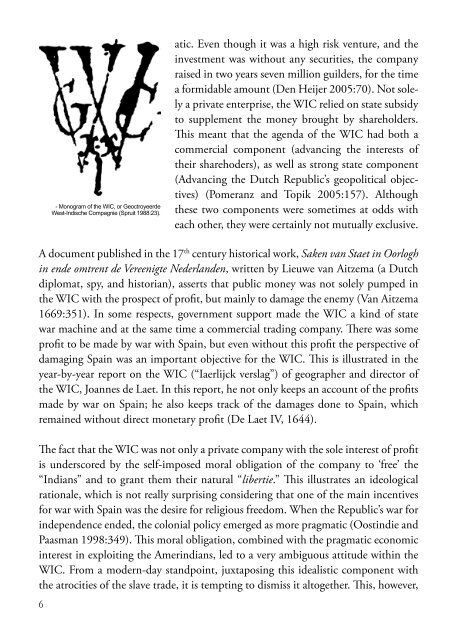Aruba navigating globalizing world.pdf - sociology-of-development
Aruba navigating globalizing world.pdf - sociology-of-development
Aruba navigating globalizing world.pdf - sociology-of-development
You also want an ePaper? Increase the reach of your titles
YUMPU automatically turns print PDFs into web optimized ePapers that Google loves.
A document published in the 17 th century historical work, Saken van Staet in Oorlogh<br />
in ende omtrent de Vereenigte Nederlanden, written by Lieuwe van Aitzema (a Dutch<br />
diplomat, spy, and historian), asserts that public money was not solely pumped in<br />
the WIC with the prospect <strong>of</strong> pr<strong>of</strong>it, but mainly to damage the enemy (Van Aitzema<br />
1669:351). In some respects, government support made the WIC a kind <strong>of</strong> state<br />
war machine and at the same time a commercial trading company. There was some<br />
pr<strong>of</strong>it to be made by war with Spain, but even without this pr<strong>of</strong>it the perspective <strong>of</strong><br />
damaging Spain was an important objective for the WIC. This is illustrated in the<br />
year-by-year report on the WIC (“Iaerlijck verslag”) <strong>of</strong> geographer and director <strong>of</strong><br />
the WIC, Joannes de Laet. In this report, he not only keeps an account <strong>of</strong> the pr<strong>of</strong>its<br />
made by war on Spain; he also keeps track <strong>of</strong> the damages done to Spain, which<br />
remained without direct monetary pr<strong>of</strong>it (De Laet IV, 1644).<br />
The fact that the WIC was not only a private company with the sole interest <strong>of</strong> pr<strong>of</strong>it<br />
is underscored by the self-imposed moral obligation <strong>of</strong> the company to ‘free’ the<br />
“Indians” and to grant them their natural “libertie.” This illustrates an ideological<br />
rationale, which is not really surprising considering that one <strong>of</strong> the main incentives<br />
for war with Spain was the desire for religious freedom. When the Republic’s war for<br />
independence ended, the colonial policy emerged as more pragmatic (Oostindie and<br />
Paasman 1998:349). This moral obligation, combined with the pragmatic economic<br />
interest in exploiting the Amerindians, led to a very ambiguous attitude within the<br />
WIC. From a modern-day standpoint, juxtaposing this idealistic component with<br />
the atrocities <strong>of</strong> the slave trade, it is tempting to dismiss it altogether. This, however,<br />
6<br />
- Monogram <strong>of</strong> the WIC, or Geoctroyeerde<br />
West-Indische Compagnie (Spruit 1988:23).<br />
atic. Even though it was a high risk venture, and the<br />
investment was without any securities, the company<br />
raised in two years seven million guilders, for the time<br />
a formidable amount (Den Heijer 2005:70). Not solely<br />
a private enterprise, the WIC relied on state subsidy<br />
to supplement the money brought by shareholders.<br />
This meant that the agenda <strong>of</strong> the WIC had both a<br />
commercial component (advancing the interests <strong>of</strong><br />
their sharehoders), as well as strong state component<br />
(Advancing the Dutch Republic’s geopolitical objectives)<br />
(Pomeranz and Topik 2005:157). Although<br />
these two components were sometimes at odds with<br />
each other, they were certainly not mutually exclusive.


